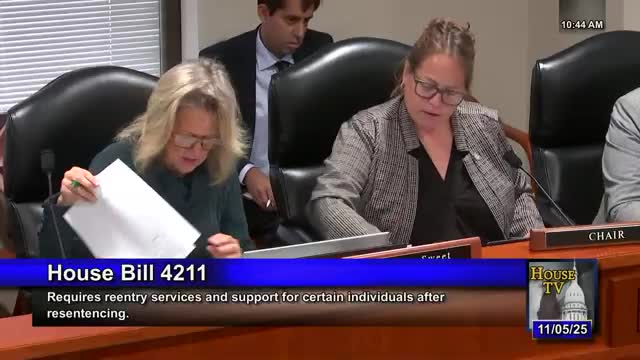Committee hears emotional testimony on vulnerable roadway user bills to enhance penalties for drivers injuring pedestrians and cyclists
Get AI-powered insights, summaries, and transcripts
Subscribe
Summary
The House Judiciary Committee heard extensive testimony on a bipartisan package of bills that would expand protections for pedestrians, cyclists, wheelchair users and micro-mobility-device users and give prosecutors additional penalties for motor-vehicle actions that cause serious injury or death to those users.
Representative Rogers and Representative Wenzel presented a bipartisan vulnerable roadway user (VRU) package — House Bills 4334 and 4335 — and the House Judiciary Committee heard extensive testimony from survivors, advocates and law-enforcement professionals.
Representative Rogers said the package "adds a section to the Michigan vehicle code" and defines a vulnerable transportation device in part by power and speed thresholds (an electrical propulsion system with an average power of about 750 watts or 1 horsepower or a maximum speed of 30 miles per hour). Rogers said the bills "provide enhanced penalties for moving violations that cause serious injury or death and provide a definition of vulnerable transportation device and vulnerable roadway users," and that the change is intended to give prosecutors additional charging options in cases that now often result in misdemeanor traffic charges.
Multiple survivors and advocates gave emotional, detailed accounts of crashes and the aftermath. Paul Runnels, a member of the Chain Gang bicycle club and a survivor of the June 7, 2016 crash in Kalamazoo County, described the collision that killed five members of his group and urged passage of the bills. Stephanie Campbell described losing her fiancé while he was cycling and told the committee, "I will give birth to a baby who will never hear David's voice, never feel his arms, and never call him daddy," and urged lawmakers to pass the bills "for clarity, accountability, and for the families who still have a chance to remain whole." Jeffrey Kerrick, a retired law-enforcement officer, testified that prosecutors often lack intermediate charging options between a one-year misdemeanor driving offense and second-degree murder and said the bills would provide more appropriate prosecutorial tools.
Advocacy organizations including the Michigan League of Bicyclists and local cycling groups supported the package, highlighting crash data and safety concerns. Testimony included discussion of specific cases (for example, the June 7, 2016 Chain Gang crash) and instances in which prosecutors successfully obtained higher charges when additional aggravating facts (such as drug or alcohol impairment) were provable.
Committee members asked procedural and scope questions on how the bills would apply in edge cases — for example, whether a wheelchair user not following traffic rules would be covered — and sponsors emphasized that existing traffic laws and the investigative process would remain in place and that VRU statutes would provide an additional charging option for prosecutors. No committee vote on these bills is recorded in the transcript; the hearing portion consisted of sponsor remarks and public testimony.
